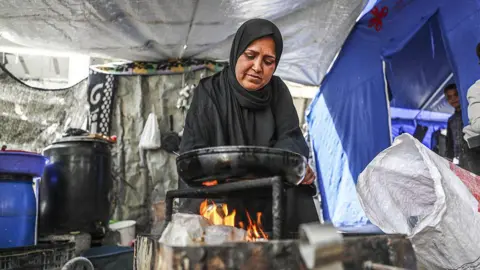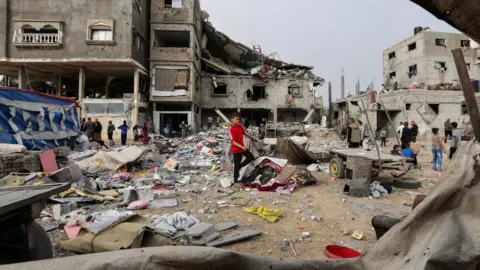Gaza is a 'killing field', says UN chief, as agencies urge world to act on Israel's blockade
 Getty Images
Getty ImagesThe UN's secretary-general says "aid has dried up [and] the floodgates of horror have re-opened" in the Gaza Strip, where Israel has blocked the entry of all goods and resumed the war against Hamas.
"Gaza is a killing field, and civilians are in an endless death loop," António Guterres said on Tuesday.
His comments come after the heads of six UN agencies appealed to world leaders to act urgently to ensure food and supplies reached Palestinians there.
Israel's foreign ministry insisted there was enough food in Gaza and accused Guterres of "spreading slander against Israel".
Israel blockaded Gaza on 2 March, after the first stage of a ceasefire expired. Hamas refused to extend that part of the truce, accusing Israel of reneging on its commitments.
Israel then renewed its aerial bombardment and ground offensive on 18 March and these have since killed 1,449 Palestinians, according to the Hamas-run health ministry in Gaza. The Israeli military insists it does not target civilians.
In his address to journalists, Guterres said Israel, as the occupying power, had obligations under international law to ensure that food and medical supplies get to the population.
"The current path is a dead end – totally intolerable in the eyes of international law and history," he said.
Responding to the comments, Israel's foreign ministry said there was no aid shortage in Gaza.
"As always, you don't let the facts get in the way when spreading slander against Israel," spokesman Oren Marmorstein said.
"There is no shortage of humanitarian aid in the Gaza Strip - over 25,000 aid trucks have entered the Gaza Strip in the 42 days of the cease fire," he added.
Guterres's comments followed a joint statement issued by six UN agencies on Monday that said world leaders must act urgently to make sure food and aid supplies get to Palestinians in the Strip.
Gazans were "trapped, bombed and starved again", the statement said.
"The latest ceasefire allowed us to achieve in 60 days what bombs, obstruction and lootings prevented us from doing in 470 days of war: life-saving supplies reaching nearly every part of Gaza," it said.
"While this offered a short respite, assertions that there is now enough food to feed all Palestinians in Gaza are far from the reality on the ground, and commodities are running extremely low."
The statement was signed by the heads of:
- OCHA - UN's Office for the Co-ordination of Humanitarian Affairs
- Unicef - UN's children's agency
- WFP - World Food Programme
- WHO - World Health Organization
- Unrwa - UN agency for Palestinian refugees
- UNOPS - UN Office for Project Services
Because of the blockade, all UN-supported bakeries have closed, markets are empty of most fresh vegetables and hospitals are rationing painkillers and antibiotics.
The statement says that Gaza's "partially functional health system is overwhelmed [and]... essential medical and trauma supplies are rapidly running out."
"With the tightened Israeli blockade on Gaza now in its second month, we appeal to world leaders to act – firmly, urgently and decisively – to ensure the basic principles of international humanitarian law are upheld.
"Protect civilians. Facilitate aid. Release hostages. Renew a ceasefire."
The two-month pause in fighting saw a surge in humanitarian aid let into Gaza, as well as the release by Hamas of 33 hostages - eight of them dead - in exchange for about 1,900 Palestinian prisoners held by Israel.
 Reuters
ReutersOn Tuesday, Gaza's Hamas-run health ministry said at least 58 people had been killed in the territory over the previous 24 hours.
Israeli strikes overnight killed 19 people, including five children whose home in the central town of Deir al-Balah was hit, according to the Hamas-run Civil Defence agency.
Another 11 people were reportedly killed in two separate strikes in the northern town of Beit Lahia and an area north-west of Gaza City.
Meanwhile, the Palestinian Journalists Syndicate (PJS) said a second Palestinian journalist had died of the wounds following an Israeli strike on Monday.
Ahmed Mansour suffered severe burns when a media tent in the southern city Khan Younis was hit, also killing his Palestine Today colleague Helmi al-Faqaawi.
The Israeli military said the strike targeted a third journalist, Hassan Eslaih, whom it accused of being a "Hamas terrorist". The PJS said Eslaih was in a critical condition following the attack, along with several other journalists.
The war was triggered by Hamas's unprecedented attack on Israel on 7 October 2023, in which about 1,200 people were killed and 251 others taken back to Gaza as hostages.
More than 50,810 Palestinians have been killed in the Israeli offensive since then, according to Gaza's health ministry.
